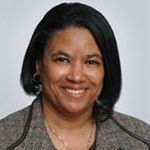Speakers Reflect on Teamwork and Resilience at Annual Rebecca Lee Crumpler Symposium
 Sheila Chapman, MD
Sheila Chapman, MDSpeaking at this year’s Rebecca Lee Crumpler Symposium, Sheila Chapman, MD, a clinical associate professor of medicine, assistant dean of admissions and director of the Early Medical School Selection Program, shared her insights on how teamwork promotes resilience, academic opportunity and joy.
“Her barriers to success were enormous,” said Chapman about Crumpler. “There had to be a profound reserve of courage and resilience.”
Crumpler was the first Black woman in the U.S. to train at a U.S. medical school and earn a medical degree, graduating from New England Female Medical College in 1864 (which was eventually incorporated into BU’s medical school), and faced the twin challenges of sexism and racism.
“When I look back on my own life, using Rebecca Lee Crumpler’s life as an example…I see that resilience must run through my veins as well,” said Chapman.
This was the fifth annual Crumpler symposium and was held virtually with nearly 60 attendees. Chapman was the keynote speaker at the event, which also included a panel discussion.
Chapman grew up in a middle-class family in Queens, NY. She chose a career in medicine because she loved science, and she saw the need for physicians to treat the marginalized and overlooked members of her community.
Teamwork has been a major pillar of my resilience.
Sheila Chapman, MD
“Teamwork has been a major pillar of my resilience,” she said. “For me, it was all about following my passions, desiring to learn more about the things I was interested in and having the repeated opportunities to work with people who exhibited similar values and passions.”
Chapman cited the teamwork involved when late Boston Mayor Thomas Menino named her to a panel along with former Massachusetts Port Authority CEO Craig Coy and former congressman James Shannon, then-president of the National Fire Protection Association in response to the death of two Boston firefighters in a 2007 fire at a West Roxbury restaurant. Autopsies revealed a high blood alcohol level in one firefighter and the presence of cocaine in the second firefighter. The panel reviewed drug and alcohol policies and procedures of the Boston Fire Department.
Many of her recommendations were adopted including the random drug and alcohol screening in 2010 despite resistance from the union in what became a highly politicized process. Through her personal dialogues with individuals on both sides of the conflict it became clear all agreed the safety and health of the firefighters was the issue of paramount importance. Chapman praised the cooperative effort that prevailed.
“It took time and patience, but this was really one of the most significant experiences I’ve had in my professional life,” she said.
Symposium panelists also reflected on teamwork and resiliency. They included Isidore Berenbaum, MD, a clinical associate professor of psychiatry; Lavern Blake, MBA, director of operations and performance management at Boston Medical Center (BMC); Cassandra Pierre, MD, MPH, MSc, assistant professor of medicine and medical director of BMC public health programs; and Alyssa Peterkin, MD, assistant professor of medicine and program director for the Grayken Addiction Medicine Fellowship and co-director of the Addiction and Health Track in the LEADS course at the Boston University Chobanian & Avedisian School of Medicine.
Like other panelists, Berenbaum said a health care team must balance the seriousness of the job with camaraderie and a sense of humor.
“We cry at times, obviously, we see the death and dying, the difficult things,” he said. “But you can’t function unless you have that camaraderie, that friendship…That’s what makes it tolerable, and I think that’s what makes us all resilient in many ways.”
Watch the video of the symposium here.